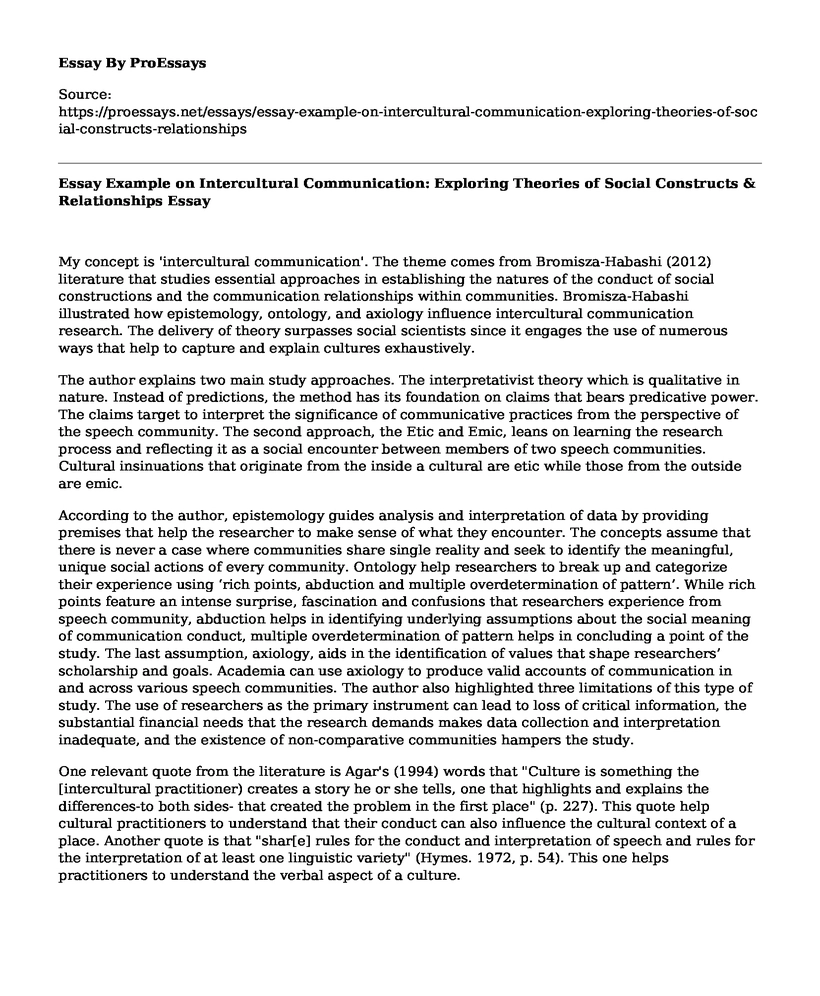My concept is 'intercultural communication'. The theme comes from Bromisza-Habashi (2012) literature that studies essential approaches in establishing the natures of the conduct of social constructions and the communication relationships within communities. Bromisza-Habashi illustrated how epistemology, ontology, and axiology influence intercultural communication research. The delivery of theory surpasses social scientists since it engages the use of numerous ways that help to capture and explain cultures exhaustively.
The author explains two main study approaches. The interpretativist theory which is qualitative in nature. Instead of predictions, the method has its foundation on claims that bears predicative power. The claims target to interpret the significance of communicative practices from the perspective of the speech community. The second approach, the Etic and Emic, leans on learning the research process and reflecting it as a social encounter between members of two speech communities. Cultural insinuations that originate from the inside a cultural are etic while those from the outside are emic.
According to the author, epistemology guides analysis and interpretation of data by providing premises that help the researcher to make sense of what they encounter. The concepts assume that there is never a case where communities share single reality and seek to identify the meaningful, unique social actions of every community. Ontology help researchers to break up and categorize their experience using ‘rich points, abduction and multiple overdetermination of pattern’. While rich points feature an intense surprise, fascination and confusions that researchers experience from speech community, abduction helps in identifying underlying assumptions about the social meaning of communication conduct, multiple overdetermination of pattern helps in concluding a point of the study. The last assumption, axiology, aids in the identification of values that shape researchers’ scholarship and goals. Academia can use axiology to produce valid accounts of communication in and across various speech communities. The author also highlighted three limitations of this type of study. The use of researchers as the primary instrument can lead to loss of critical information, the substantial financial needs that the research demands makes data collection and interpretation inadequate, and the existence of non-comparative communities hampers the study.
One relevant quote from the literature is Agar's (1994) words that "Culture is something the [intercultural practitioner) creates a story he or she tells, one that highlights and explains the differences-to both sides- that created the problem in the first place" (p. 227). This quote help cultural practitioners to understand that their conduct can also influence the cultural context of a place. Another quote is that "shar[e] rules for the conduct and interpretation of speech and rules for the interpretation of at least one linguistic variety" (Hymes. 1972, p. 54). This one helps practitioners to understand the verbal aspect of a culture.
Conclusion
This pieces of literature aids in understanding two aspects of intercultural communication, including high and low context cultures, and the non-verbal, oral and written cultures. Since the research entails interaction with community members, a researcher can tell if a specific group has a low or high context culture. A group with low context always exhibit less culturally defined stimuli, environment, or ambience surrounding the environment, and need a lot of background information. Observation, recording or documenting helps researchers in understanding the non-verbal, oral and written cultures. Since this aspect focuses on items that enhance communications, it helps in establishing the effectiveness of intercultural messages.
Cite this page
Essay Example on Intercultural Communication: Exploring Theories of Social Constructs & Relationships. (2023, Sep 04). Retrieved from https://proessays.net/essays/essay-example-on-intercultural-communication-exploring-theories-of-social-constructs-relationships
If you are the original author of this essay and no longer wish to have it published on the ProEssays website, please click below to request its removal:
- Determinants of Social and Cultural Status in the Society Essay
- Assignment Example on Ethical Issues in Criminal Justice
- Essay Sample on Small and Diverse Groups
- What is Friendship?: Plato's Lysis Dialogue Explores Definitions - Essay Sample
- Essay on Community-Based Nursing: A Catalyst for Quality Care and Improved Outcomes
- Unequal Social Relations in Human Society: An Anthropological Perspective - Essay Sample
- Essay Example on Marcus Garvey: A Hero of African-American History







